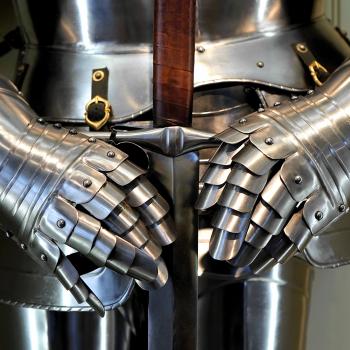To Train Up A Child, chapter 9, part 2
We are still in the chapter titled “Training Examples.” As I promised last week, I want to try to bring a specific theme out in each post as I cover this section. This week’s theme is creating a police state in your own home.
THE LITTLE FOXES SPOIL THE VINES
We just returned from having supper with some good neighbors. They are a fine young couple who are just beginning their family. They are kind parents, concerned to rear their children properly. They would never be guilty of abuse or neglect. Their children are their priority. But, as we sat talking, I was once again reminded that it is the little “insignificant” things that determine a child’s character.
The little three-year-old boy was between us playing with a little rubber bathtub type animal. He apparently discovered there was still some water in it, so he held the rubber goat over the table and began to squeeze. To the delight of everyone, and especially the boy, the goat began to relieve itself on the coffee table. After a good laugh, the mother went to the kitchen for a towel.
When she attempted to wipe it up, the little fellow said, “No,” and tried to prevent her from removing his water puddle. She easily brushed him aside and wiped the puddle away. He gasped an angry and frustrated protest, threw himself on the couch and cried. The cry was not loud and did not last five seconds before he jerked around with protruded lip to see what other entertainment was available. It was all over in ten seconds.
The conversation resumed as he performed the first of a series of deliberate transgressions. He climbed onto the coffee table—which is always off limits—and then sought out other expressions of defiance. After about the fifth command, he would cease and go to the next transgression. The conversation continued with only an occasional lapse while he was being rebuked. This is exactly the kind of issue that demands concentrated training and discipline. To ignore it, as they did, is to waste your child.
What did the child learn? He learned that his mother is bigger than he and can force her will upon him. This will result in his enforcing his will upon his younger brother. He learned that he does not have to exercise self-control. Anything that he is big enough to accomplish is fair game. The anger that was allowed to seethe in his heart led to rebellion. Though the parents were unaware of it, his subsequent actions were the product of his defiled heart.
I’m continually surprised when Michael chides parents for sending their children the message that whoever is biggest can force their will on those who are smaller. I’m surprised because that is what is heart and center of Michael’s own methods. Michael, if you will remember, earlier wrote “If you have to sit on him to spank him then do not hesitate. And hold him there until he is surrendered. Prove that you are bigger, tougher, more patiently enduring and are unmoved by his wailing. Defeat him totally.” Just last week Michael wrote of his wife trading blows with a toddler and said affirmingly that “Most little bullies are cured by meeting a bigger bully.” So what even is this?
I thought I’d take a moment, now, to explain how I would have handled this situation. The three-year-old boy was upset when his mother cleaned up his water puddle, presumably because he wanted to play in it. Playing with water is fun! It’s one of my own small children’s favorite activities. But the boy’s mother cleaned the water up anyway, without listening to or (it sounds like) communicating with her son. Her son then began to act out, trying to get her attention and trying to assert some form of control over the situation—a situation in which he was in fact helpless. His mother should have heard what he was communicating—that he had wanted to play in the puddle, and that he was upset that she didn’t take his desires into account. If I were in that situation, I would have communicated with the child and found a solution amenable to us both. That doesn’t necessarily mean not cleaning up the puddle—it might have been on a nice table, or in a walkway, after all. It might simply mean pulling a chair up to a sink and running some water, providing the child with measuring cups, bowls, and mixing spoons. This sort of solution communicates that everyone’s needs are important, and it helps teach communication and compromise.
So, what does Michael think this young mother should have done?
THE PROPER RESPONSE
The proper response would have gone something like this: “Johnny, here is a rag, clean up your mess.” “No, I don’t ‘wanna’.” And he continues to dabble in the water, sort of rocking back and forth with one shoulder and the chin down, not too earnestly involved in the water, yet waiting to see if the mother is going to let him be. Rebellion is in his heart; but he faces a superior power, so he hesitates. She again says, “Johnny, clean the water up now.” (With my children, one command is all they would get.) If he again hesitates, she goes for her switch. If he hurriedly attempts to avert a switching by cleaning the water, it will make no difference. She returns with the switch, and sitting in front of him, says, “Johnny, I told you to wipe up the water, and you hesitated, therefore I am going to have to spank you so you will not hesitate the next time Mama wants her boy to grow up to be wise like Daddy, so I am going to help you to remember to obey. Lean over the couch. Put you hands down. Now, don’t move or I will have to give you more licks.”
She then administers about ten slow, patient licks on his bare legs. He cries in pain. If he continues to show defiance by jerking around and defending himself, or by expressing anger, then she will wait a moment and again lecture him and again spank him. When it is obvious he is totally broken, she will hand him the rag and very calmly say, “Johnny, clean up your mess.” He should very contritely wipe up the water. To test and reinforce this moment of surrender, give him another command. “Johnny, go over and put your toys all back in the box.” Or, “Johnny, pick up all the dirty clothes and put them in the basket.” After three or four faithfully performed acts of obedience, brag on how “smart” a helper he is. For the rest of the day, he will be happy and compliant. The transformation is unbelievable.
You have just witnessed the potential making of a peaceful home and of an emotionally stable and obedient child. If you are faithful to guard against and reward every infraction, whether in attitude or action, in just a few days you will have a perfectly obedient and cheerful child.
Oh, that’s right. Michael’s solution is to turn the home into a brutal dictatorship ruled by the sting of rod—one where children’s feelings are irrelevant and the goal is to leave children “totally broken.” Remind me, how is the child not learning that “his mother is bigger than he and can force her will upon him”? Because as I read it, that is exactly what he learns.
Honestly? These bits are the hardest part of the book to get through, for me. “Now, don’t move or I will give you more licks.” “If he continues to show defiance by jerking around and defending himself, or by expressing anger, then she will wait a moment and again lecture him and again spank him.” I remember this. I remember this only too well. I was raised by parents who followed the Pearls and the methods laid out in this book. Trying to get away, trying to avoid the pain, being angry, being anything but broken—those things meant more pain, more humiliation. The goal was to deaden your emotions and put on a mask so as to get out of the situation as quickly and with as few licks as possible.
I get a cold ball of fear in the pit of my stomach when I think about it.
I DON’T HAVE THE TIME
Now, I know exactly what some of you are thinking. “But, I am pushed to the limit now. I don’t have the time to watch and guard against every transgression.”
See, this isn’t actually what I was thinking. What I was thinking involves language I don’t think I can put in print here.
If you have duties outside the home that prevent you from properly rearing your children, give them back to the Devil. I mean that, even if they are church activities. If you have children your first calling is that of a parent. If, on the other hand, you are over-extended because of a chaotic household, then you cannot afford to do other than be faithful in discipline, for you need the rest it will bring.
Look, I agree that you shouldn’t make the decision to have children unless you are willing to put a huge priority on raising them. There will be many times you as a parent have to put your own desires aside to tend to your children’s needs. (2 a.m. feeding anyone?) But I worry that Michael’s emphasis on the duty of parenting over parental need for self-care creates a dangerous imbalance. Parents need to have their own interests, their own time, their own space apart from their children, just for their own emotional health and mental wellbeing. This isn’t entirely selfish either—more stable adults make better parents.
And of course, I’m also extremely concerned that for Michael, proper parenting means enforcing a police state in your own home. And note the threat—if you don’t enforce a police state you are handing your children to the Devil.
Just yesterday, a young mother of small children came to the house and told my wife this story:
“This morning, as I was sitting at the sewing machine, my son [four years old] came to me and said, ‘Mother, I love you so much.’ I stopped sewing, looked at the earnest expression on his face, and said, ‘I’m glad you love me, for I love you too. You are such a fine boy.’ As I attempted to turn back to the sewing, he said, ‘Do you know why I love you so much?’ ‘No, why do you love me so?’ ‘Because, you make me bring in firewood and do what you say.”
This mother always looks fresh and rested. I know this sounds pretentious, but it is the absolute truth. Even a four-year-old can compare himself with other children and appreciate his parents’ guidance.
I’m really not sure whether to take these stories seriously, because this is at least the third time Michael has told one like this. In fact, earlier Michael wrote of overhearing a “rebellious teenager” saying “If they only loved me enough to whip me.” I totally buy that some children are so neglected and starved for love that they may crave any attention at all, even abusive attention. I also get that children need at least a base level of structure and stability. I get it. But this idea that holding children down and whipping them, defeating them totally, and creating a permanent police state results in genuine love between child and parent? Not, you know, kindness, respect, acceptance, or communication? Really? This is just bizarre.
I’m also feeling increasingly uncomfortable with the level of detail Michael goes into in the examples he provides. It feels completely unnecessary, and it’s starting to feel like Michael is deriving pleasure from describing children’s pain.









